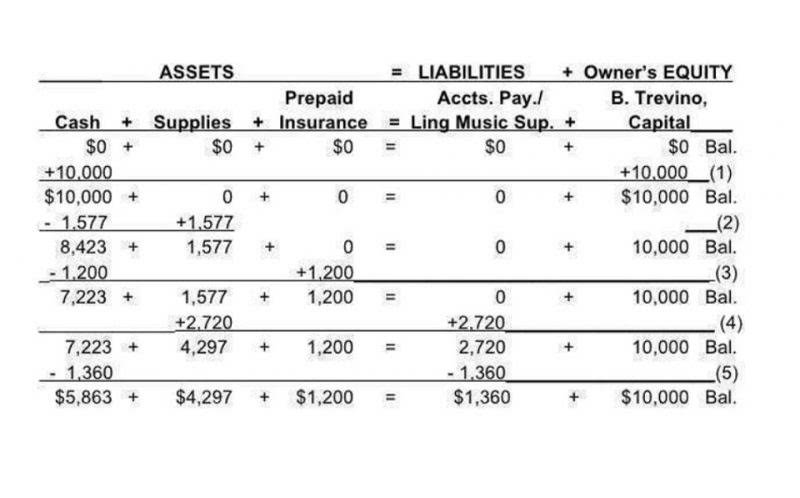
Farmowners Insurance – farmowners insurance sold for personal, family or household purposes. This package policy is similar to a homeowners policy, in that it has been developed for farms and ranches and includes both property and liability coverage for personal and business losses. Coverage includes farm dwellings and bookkeeping their contents, barns, stables, other farm structures and farm inland marine, such as mobile equipment and livestock. Environmental Pollution Liability – liability coverage of an insured to persons who have incurred bodily injury or property damage from acids, fumes, smoke, toxic chemicals, waste materials or other pollutants. Understanding when an expense is incurred is crucial for accurate financial reporting, but it’s not without its challenges. Businesses often face various pitfalls in recognizing and recording expenses, and being aware of these common issues can help avoid costly mistakes and ensure compliance with accounting standards.
Glossary of Insurance Terms
- Automobile Liability Insurance – coverage for bodily injury and property damage incurred through ownership or operation of a vehicle.
- Annuitant – the beneficiary of an annuity payment, or person during whose life and annuity is payable.
- Book Value – original cost, including capitalized acquisition costs and accumulated depreciation, unamortized premium and discount, deferred origination and commitment fees, direct write-downs, and increase/decrease by adjustment.
- Commercial Multiple Peril – policy that packages two or more insurance coverages protecting an enterprise from various property and liability risk exposures.
- Accurate expense recognition is not just an accounting technicality—it’s a powerful tool for business success and financial transparency.
- Builders’ Risk Policies – typically written on a reporting or completed value form, this coverage insures against loss to buildings in the course of construction.
For example, in United States v. Goncalves, 642 F.3d 245 (1st Cir. 2011), the First Circuit Court of Appeals defined incurred as “to which one is subject,” not “already imposed.” And in 515 Ave. 3d 1228A (N.Y. Sup. Ct. Kings Co. 2010) (citations omitted), a Brooklyn trial court distinguished between damages suffered and cost or damage incurred. The court stated that “suffered” means paid while “incurred” means become liable for.

More Definitions of Incurred Expenses
- Use data analytics tools to gain insights from expense data and identify patterns and anomalies in expense reports.
- If a court rules that a company must pay damages or fines, the expense is incurred when the judgment is made, not when it’s paid.
- The Florida Supreme Court has held that “‘to incur’ means to become liable for the expense, but not necessarily to have actually expended it.
- To resolve the appeal, the circuit court had to construe the meaning of “incurred” under New York law.
- Dental Only – line of business providing dental only coverage; coverage can be on a stand-alone basis or as a rider to a medical policy.
- Continuation of Care Requirement – statutory or contractual provision requiring providers to deliver care to an enrollee for some period following the date of a Health Plan Company’s insolvency.
It ensures that financial statements accurately reflect the company’s economic reality, provides a solid foundation for financial analysis, and helps stakeholders make informed decisions. Prepaid expenses are paid in advance but recognized as expenses over time, requiring careful tracking to ensure proper expense recognition. The initial payment is recorded as an asset, and the expense is then recognized incrementally as the benefit is received. Understanding these triggers for expense incurrence is essential for maintaining accurate financial records. By recognizing expenses at the appropriate time, businesses can present a more accurate picture of their financial position and make better-informed decisions based on up-to-date financial information. The district court dismissed the complaint for failure to state a claim on the motion of the insurer, and the policyholder appealed.
- Merriam-Webster’s dictionary defines “incur” to mean “to become liable or subject to.” In layman’s terms, to “incur the cost of something” means to spend money on something.
- Perform periodic audits of expense reports to ensure compliance with company policies and analyze expense trends to identify potential issues or opportunities for cost savings.
- The plan may provide extra coverage such as vision, hearing, dental, and/or health and wellness programs.
- Viatical Settlements – contracts or agreements in which a buyer agrees to purchase all or a part of a life insurance policy.
- Protected Cell – an insurance-linked security retained within the insurance or reinsurance company and is used to insulate the proceeds of the securities offering from the general business risks of the insurer, granting an additional comfort level for investors of the securitized instrument.
- Understanding the details of expense recording and its influence on financial records is essential for sustaining strong business finances.
Cash Flow Statement Considerations
Change in Valuation Basis – a change in the interest rate, is insurance expense a debit or credit mortality assumption or reserving method or other factors affecting the reserve computation of policies in force. Balance Sheet – accounting statement showing the financial condition of a company at a particular date. Authorized Reinsurance – reinsurance placed with a reinsurer who is licensed or otherwise allowed to conduct reinsurance within a state. Assisted Living Care – a policy or rider that provides coverage only while a policyholder is confined to an assisted living facility and meets the policy requirements for coverage. Asset Risk – in the risk-based capital formula, risk assigned to the company’s assets.


Collar – an agreement to receive payments as the buyer of an Option, Cap or Floor and to make payments as the seller of a different Option, Cap or Floor. Captive Insurer – an insurance company established by a parent firm for the purpose of insuring the parent’s exposures. Capital Gains (Loss) – excess (deficiency) of the sales price of an asset over its book value. Calculated on the basis of original cost adjusted, as appropriate, for accrual of discount or amortization of premium and for depreciation. Burglary and Theft – coverage for property taken or destroyed by breaking and entering the insured’s premises, burglary or theft, forgery or counterfeiting, fraud, kidnap and ransom, and off-premises exposure.
Lifetime Disability Benefit – a provision in some disability income policies to recoup lost wages for the term of disability or remainder of insured’s life in case of permanent disability. Life – Endowment – insurance that pays the same benefit amount should the insured die during the term of the contract, or if the insured survives to the end of the specified coverage term or age. Investment Income Due – investment income earned and legally due to be paid to the reporting entity as of the reporting date.
Panel Discussion on Homeowner’s Property Insurance Cost Drivers
The contract provides for the initiation of payments at some interval that may vary, however the annuity payouts must begin within 13 months. Contractual Liability – liability coverage of an insured who has assumed the legal liability of another party by written or oral contract. Includes a contractual liability policy providing coverage for all obligations and liabilities incurred by a service contract provider under the terms of service contracts issued by the provider. Understanding when expenses are incurred is crucial for accurate financial reporting. The timing of expense recognition can significantly affect a company’s financial statements, influencing key metrics and potentially altering stakeholders’ perceptions of the business’s financial health.
Separate Account – segregated funds held and invested independently of other assets by an insurer for the purpose of a group retirement fund. Risk – Uncertainty concerning the possibility of loss by a peril for which insurance is pursued. Pure Risk – circumstance including possibility of loss or no loss but no possibility of gain. Law Firm Accounts Receivable Management Prior Approval Law – a state regulatory requirement for pre-approval of all insurance rates and forms. Personal Auto Policy – coverage designed to insure private passenger automobiles and certain types of trucks owned by an individual or husband and wife.


 Hola, ¿Cómo puedo ayudar?
Hola, ¿Cómo puedo ayudar?